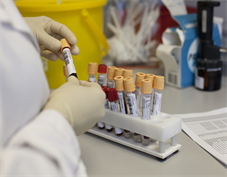Arthritis drugs may help sickest patients with COVID-19
14 January 2021 - Arthritis drugs may offer fresh hope for sickest patients in hospital with COVID-19

Two drugs which are normally used to treat people for arthritis may reduce mortality and shorten stays in intensive care units (ICUs) for those critically ill with COVID-19, findings from the REMAP-CAP trial suggested this week. Following a statement from the UK Prime Minister Boris Johnson, both drugs will now be available to these patients on the NHS.
The drugs toculizumab and sarilumab are both immunomodulators that reduce inflammation in people with arthritis. As severe COVID-19 infection is often the result of an exaggerated immune response, these drugs were given to affected patients in hospitals across the UK – including King’s College Hospital – as part of the national REMAP-CAP trial.
Early results from the trial, which emerged this week, appeared to show that the drugs reduced mortality in critically ill COVID-19 patients – those receiving breathing support in ICU – by 8.5%. This means that for every 12 patients given either drug, one life could be saved. The drugs also reduced the time spent in intensive care by up to one week. These findings come in addition to previous results which showed that toculizumab may improve outcomes among critically ill COVID-19 patients, yet at that time the impact on patient survival and ICU stay was not clear.
The REMAP-CAP trial is led at KCH by ACET Research Delivery Unit (RDU) Lead Dr Phil Hopkins and consultant pharmacist Reena Mehta, and has mainly been delivered by ACET and PRUH RDU nurses across both Denmark Hill and PRUH sites of the Trust. It is the first platform trial in the world to be carried out in critical care. The design of this ‘smart trial’ allows for multiple treatments to be added over time and is highly adaptive, meaning that successful treatments can be quickly made available to more patients and unsuccessful treatments removed.
Although the findings are yet to be peer reviewed and published, the UK Government has stated that both of the drugs should be given to severely ill COVID-19 patients on the NHS. This will come as welcome news to those working in hospitals across the UK, which has seen a dramatic rise in cases resulting in increased pressure being put on ICUs. Echoing this, Deputy Chief Medical Officer Jonathan Van-Tam stated “This is a significant step forward for increasing survival of patients,” adding that the drugs would be “crucial for helping to relieve pressure on intensive care and hospitals and saving lives”.
